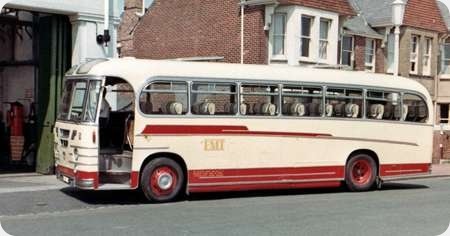PMT – Beadle Rochester – 717 AEH – C7717
Potteries Motor Traction
1956
Beadle Rochester
Beadle C41F
Taken in the summer of either 1963 or ’64 this photo of Potteries fleet number C7717 registration 717 AEH which was a Beadle Rochester C41F integral coach delivered in 1956, it is seen here about to enter Southdown’s Royal Parade garage where most tour coaches were parked and heavy repairs were carried out at that time, the Rochester was an unusual choice for extended tours probably due in some measure to it’s raucous 3 cylinder 2 stroke engine although if the revs were kept up it gave a creditable performance, for it’s day, but more revs meant more noise.
Southdown had 20 similar coaches delivered in 1957 No’s 6-25 with registrations TCD 6-15 and TUF 16-25 which were used mainly on express services.
Photograph and Copy contributed by Diesel Dave
12/10/14 – 08:53
A beautiful example of a Fanfare clone by Beadle. Shame about the raucous underpinnings.
David Oldfield
12/10/14 – 09:28
Fanfare clone was my first thought. Those engines were awful. There was a company called Trumix near Reddish, Stockport with a fleet of Commer mobile concrete mixers which regularly deafened the neighbourhood.
Phil Blinkhorn
12/10/14 – 09:29
A delightful looking coach indeed, but with integral construction I wonder what the longevity of such vehicles was. The specification "chassissless" always fills me with horror at the memory of the Yorkshire Woollen District Leyland Olympics of the 1950s – these seemingly modern buses showed signs of disintegration when almost new on the admittedly very rough minor roads of the 36 route from Sovereign Street Leeds to Elland.
Since then of course there have been commendable strides in the construction method – a certain Routemaster comes immediately of course to mind along with many other very satisfactory designs.
Chris Youhill
13/10/14 – 07:41
London Transport’s tram/trolleybus division, led by an essentially LCC tram team, were unusually adventurous in ordering chassisless trolleybuses from about 1936, yet the bus division continued the traditional way until the advent of the Routemaster. The majority of the pre-war trolleybuses led a full life, too.
Chris Hebbron
13/10/14 – 07:42
Well, I never had first hand experience of these beasts, Chris, but I never heard of any structural problems. They were, literally, Fanfare clones, Phil. In its last ten years (as "Weymann Story Part 2" explains) there were lots of happenings which added up to the eventually death of a proud and distinguished coach-builder (Weymann). One was when the directors forced the removal of a popular and competent manager, Jack Davies, in 1955. [This was just after the introduction of the Fanfare coach.] Jack Davies was snapped up by another well regarded coach-builder, Beadle, who almost immediately brought the Rochester onto the market. [To be fair to Beadle if you "remove" the Fanfare front, the rest of the coach still bears a strong family resemblance to existing Beadle coaches!] As for the weakness of integrals. Chris is, as ever, correct in his assertions. AEC (Monocoach) and Bristol (LS) had the same problems as Leyland (Olympic/Olympian). Beadle however also had extensive experience building their post war integral vehicles using pre-war parts. Again I never heard anything particularly bad about these vehicles – and they were hardly mainstream, mass-produced vehicles.
David Oldfield
13/10/14 – 07:43
These were sold shortly before I joined PMT in September 1968 after 12 years service so they must have been reasonably successful. More than can be said for the Roadliners that replaced them! We had the dubious distinction of changing the engines (due to failure) in all six Roadliners at various times at East Kent, Maidstone and District and Southdown Depots whilst they were on extended tours.
Ian Wild
13/10/14 – 17:25
Beadle were certainly an innovative concern.
Can someone explain the reason for and date of their demise?
Chris Hebbron
14/10/14 – 06:31
Beadle gave up building buses in 1958. The last were the PD2s for Southdown, built on Park Royal frames. They probably gave up because the golden years were over and supply far outweighed demand. They were a family firm with other irons in the fire – not least a Rootes car franchise. Eventually this became a VW franchise and they remain one of the most prominent VW dealers in the south.
A look at their web-site shows a big set up with, in addition, franchises for Kia, Land Rover, Nissan, Skoda and Toyota.
David Oldfield
14/10/14 – 06:33
There was certainly nothing wrong with Beadle bodywork, as it was widely used in many quarters, and not just the south east. They also built up quite a reputation with those chassisless rebuilds using Leyland Tiger/Titan or AEC Regent/Regal chassis. I always felt these looked stylish. Southdown used Beadle for a significant quantity of new builds, rebuilds and re-bodying from approx 1947 to 1957.
These included rebodying 37 Leyland TD3,4,5;
New bodies on 23 Leyland PS1’s (half-cab), and later rebuilding these and 40 Duple-bodied PS1’s to full front;
Rebuilding 50 Leyland TS7/TS8’s into chassisless coaches (20 at 30 feet and 30 at 26 feet length);
New bodies on 12 Leyland PD2/12 d/d’s (Park Royal supplied the frames);
A magnificent total of 130 coach bodies on Leyland Tiger Cub chassis (I remember these most as being on the regular Portsmouth/London service, but they fulfilled many duties);
and finally 25 Beadle-Commer TS3 coaches of the Rochester style. They look slightly different to the PMT one above due to having a central entrance.
That’s a total of 190 new bodies, 37 rebodying older stock, and 113 rebuilds of various means – grand total of 340.
I think they also did some rebuilding of Leyland TD3//4/5s which weren’t given a total re-body post-war.
I don’t recall the details of Beadles giving up coach or bus building, but they seem to have produced satisfactory work for all their customers.
Michael Hampton
14/10/14 – 06:34
John Clayton Beadle established a horse drawn carriage construction business in Lowfield Street, Dartford in 1893, and, in 1900, built a new factory in Spital Street, which was extended in 1910 to include a car sales showroom. The firm expanded during the motor age into passenger and haulage vehicle bodywork, and general engineering. During WW2 it was a subcontractor to Shorts of Rochester, supplying parts for Sunderland flying boats. Beadle continued to make bus/coach/general bodies and integral vehicles up to 1957, by which time the declining demand for such products resulted in the firm concentrating on its private car sales activities. These continue to the present day from showrooms in Princes Street, Dartford, but the firm also has outlets in other towns in Kent and south London. The 1910 construction and car showroom premises in Dartford of J. C. Beadle are now, ignominiously, a Wetherspoon pub called the ‘Flying Boat’, but the workshops to the rear were demolished many years ago. A gallery of Beadle vehicles may be found here:- www.flickr.com/groups/1890258@N22/
Strictly speaking, the Routemaster was a semi chassisless design, employing front and rear subframes to carry the engine, wheels/axles, suspension and transmission components. The self supporting bodywork provided the structural integrity for the vehicle as a whole. It has been suggested that one reason for the abandonment of the FRM was the difficulty of introducing a centre exit without seriously weakening the structure, though redesign could doubtlessly have resolved the problem. (The other reason was that Stokes was firmly against the FRM, and Leyland had the integral Titan to sell.) One fully successful integral vehicle was the Bristol LS which ran to a production total of 1409.
Roger Cox
14/10/14 – 10:59
I too can remember this Rootes engine in various vehicles- sounding like a monster version of a mad moped. Thanks for the potted history, Roger. Beadle seemed to be jobbing coachbuilders, seeing a niche for modern-looking but cheap (?) coaches for firms perhaps wanting to replace half-cabs. If we are around 1956, as seems the case, the Commer engine could also provide a response to the massive post-Suez fuel price inflation.
Eventually, sixties "affluence" and the multi-nationals with their service networks must have squeezed them out.
Joe
15/10/14 – 07:22
…..and of course the Rootes franchise also explains to Commer/Rootes running gear!
David Oldfield
15/10/14 – 07:23
Thx, folks, for the potted history of Beadles. At least they’ve survived in some form. As for their Dartford showroom, to their credit at least Wetherspoon’s have a history of preserving old buildings which otherwise would have decayed away and/or been demolished.
Chris Hebbron
29/10/14 – 07:10
At my time at Beadles they also built Commer vans, a number of Commer trucks built for the G P O MOBILE workshops for the erection of telegraph poles,and for a short while Humber Hawk estate cars. My jobs were to fit wheel arches, floor trap doors for access to the engine, stair treads. also about 12 double decker buses cant remember if they were for Southdown or Maidstone & District.
Dave Parslow
Quick links to the - Comments Page - Contact Page - Home Page
Please leave a comment
Please Note if you want to send a photograph with your comment please use the Contact Page by clicking here or send as an attachment via email.

